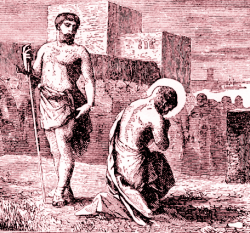Lives of the Saints
Our Models and Protectors
Spiritual Bouquet:
November 26

Saint Peter of Alexandria
Patriarch and Martyr
(† 310)
The Church of Alexandria, founded by the Evangelist Saint Mark in the name of the Apostle Saint Peter, was the head of the churches of Egypt and of several other provinces; it had lost its Metropolitan when Saint Thomas of Alexandria died at the end of the third century. Saint Peter, a priest of that city, replaced him, and soon was governing the church amid the terrors of the persecution by Diocletian and Maximian. Two bishops and more than six hundred Christians were in irons and on the verge of torture; he sent to them pastoral letters to animate them to fervor and perseverance, and rejoiced to learn that a number of them had won the grace of martyrdom.
Many, however, had preferred apostasy to a cruel death. Saint Peter was obliged to instigate penances in order for them to return to the communion of the faithful. When he deposed a bishop who had incensed an idol during the persecution, his act of justice acquired for him the hostility of a certain Arius, the bishop's favorite, who became thereafter the author of a schism and an instrument of the cruel emperor Maximian who persecuted the Christians. He in fact animated this tyrant against Saint Peter. The sentence of excommunication which Saint Peter was the first to pronounce against the two schismatics, Arius and Melitius, and which he strenuously upheld despite the united efforts of powerful members of their parties, is proof that he possessed firmness as well as sagacity and zeal.
The Patriarch was soon seized and thrown into prison. There he encouraged the confessors imprisoned with him to sing the praises of God and pray to their Saviour in their hearts, without ceasing. Saint Peter never ceased repeating to the faithful that, in order not to fear death, it is necessary to begin by dying to oneself, renouncing our self-will and detaching ourselves from all things. He was soon to give proof of his own perfect detachment in his glorious martyrdom.
While in prison he was advised in an apparition as to his successors in the Alexandrian church, and he recognized that the day of his eternal liberation was at hand. He informed these two faithful sons that his martyrdom was imminent. In effect, the emperor passed sentence of death on him, despite the fact that a crowd of persons had come to the prison with the intention of preventing by force the martyrdom of their patriarch; they remained all night for fear he might be executed in secret. But Saint Peter delivered himself up to his executioners, and died by the sword on November 26, 310. His appearance on the scaffold was so majestic that none of them dared to touch him; it was necessary to pay one of them in gold to strike the fatal blow.
Les Petits Bollandistes: Vies des Saints, by Msgr. Paul Guérin (Bloud et Barral: Paris, 1882), Vol. 13; Little Pictorial Lives of the Saints, a compilation based on Butler's Lives of the Saints and other sources by John Gilmary Shea (Benziger Brothers: New York, 1894).